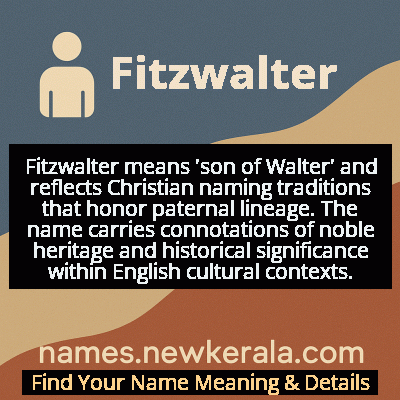Fitzwalter Name Meaning & Details
Origin, Popularity, Numerology Analysis & Name Meaning of Fitzwalter
Discover the origin, meaning, and cultural significance of the name FITZWALTER. Delve into its historical roots and explore the lasting impact it has had on communities and traditions.
Name
Fitzwalter
Gender
Male
Origin
Christian
Lucky Number
5
Meaning of the Name - Fitzwalter
Fitzwalter means 'son of Walter' and reflects Christian naming traditions that honor paternal lineage. The name carries connotations of noble heritage and historical significance within English cultural contexts.
Fitzwalter - Complete Numerology Analysis
Your Numerology Number
Based on Pythagorean Numerology System
Ruling Planet
Mercury
Positive Nature
Adventurous, dynamic, curious, and social.
Negative Traits
Restless, impatient, inconsistent, prone to indulgence.
Lucky Colours
Green, white.
Lucky Days
Wednesday.
Lucky Stones
Emerald.
Harmony Numbers
1, 3, 9.
Best Suited Professions
Sales, marketing, travel, entertainment.
What People Like About You
Versatility, charisma, adventurous spirit.
Famous People Named Fitzwalter
Robert Fitzwalter
English Baron and Military Leader
Leader of the baronial opposition against King John and one of the 25 sureties of Magna Carta
Walter Fitzwalter
English Nobleman
7th Baron FitzWalter, prominent during the Hundred Years' War and served as Admiral of the Fleet
John Fitzwalter
English Knight
Notorious for his lawlessness and private wars in Essex, eventually pardoned by Edward III
Henry Fitzwalter
Religious Figure
Abbot of Westminster Abbey who oversaw significant monastic reforms
Name Variations & International Equivalents
Click on blue names to explore their detailed meanings. Gray names with will be available soon.
Cultural & Historical Significance
The 'Fitz' prefix, meaning 'son of,' reflects the Norman practice of patronymic naming that became institutionalized among the English aristocracy, creating a bridge between continental European and British naming traditions that persisted through centuries of social evolution. The name's survival into modern times demonstrates the enduring appeal of historical continuity and the romanticization of medieval heritage in contemporary naming practices, particularly among families with English ancestral connections seeking to honor their lineage while maintaining a distinctive identity.
Extended Personality Analysis
Individuals bearing the name Fitzwalter are often perceived as possessing a strong sense of tradition and family honor, reflecting the name's aristocratic origins. They tend to exhibit leadership qualities, determination, and a natural authority that commands respect in both personal and professional settings. The historical weight of the name suggests someone who values legacy and continuity, often displaying loyalty to principles and institutions while maintaining a dignified presence.
These individuals typically combine practical wisdom with strategic thinking, making them effective in positions requiring both vision and execution. Their personality often balances conservative values with a progressive understanding of responsibility, creating individuals who respect the past while actively shaping the future through thoughtful action and principled decision-making. The name's association with historical figures who challenged authority while upholding tradition suggests a personality capable of both reverence and reform, embodying the ideal of principled leadership that honors heritage while embracing necessary change.
Modern Usage & Popularity
In contemporary times, Fitzwalter remains a rare but distinguished given name, primarily used in English-speaking countries with strong historical connections to Norman heritage. Its usage has seen a modest revival among families seeking unique traditional names with aristocratic connotations, particularly in the United Kingdom and among descendants of British immigrants. While never achieving mainstream popularity, the name maintains a steady presence in genealogical and historical circles, often chosen by parents interested in medieval history or family lineage. Modern usage typically reflects an appreciation for historical continuity rather than fashion trends, positioning Fitzwalter as a name that bridges centuries of English cultural heritage while remaining distinctive in the 21st century naming landscape.
Symbolic & Spiritual Meanings
Symbolically, Fitzwalter represents the enduring power of lineage and the transmission of family legacy across generations. The name embodies the concept of inherited responsibility and the weight of historical continuity, suggesting both privilege and obligation. Metaphorically, it signifies the bridge between past and present, carrying the strength of ancestral wisdom while facing contemporary challenges. The 'son of' construction emphasizes the importance of paternal bonds and the intergenerational transfer of values, making it symbolic of tradition preservation and cultural memory. As a name that witnessed pivotal moments in constitutional history, it also symbolizes the struggle for rights and the balance between authority and liberty, representing the ideal of principled leadership grounded in historical awareness and moral conviction.

